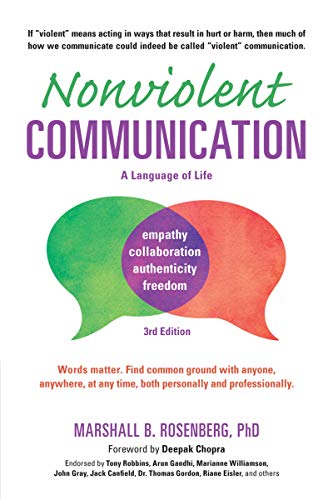Nonviolent Communication: A Language of Life: Life-Changing Tools for Healthy Relationships (Nonviolent Communication Guides)
amazon.com
Nonviolent Communication: A Language of Life: Life-Changing Tools for Healthy Relationships (Nonviolent Communication Guides)

NVC clearly distinguishes three components in the expression of appreciation: the actions that have contributed to our well-being the particular needs of ours that have been fulfilled the pleasureful feelings engendered by the fulfillment of those needs
we have been taught by society to criticize, insult, and otherwise (mis)communicate in ways that keep us apart.
punishment and reward interfere with people’s ability to do things motivated by the reasons we’d like them to have.
NVC suggests that our paraphrasing take the form of questions that reveal our understanding while eliciting any necessary corrections from the speaker. Questions may focus on these components: what others are observing: “Are you reacting to how many evenings I was gone last week?” how others are feeling and the needs generating their feelings: “Are
... See moreWhen we address a group without being clear what we are wanting back, unproductive discussions will often follow. However, if even one member of a group is conscious of the importance of clearly requesting the response that is desired, he or she can extend this consciousness to the group.
We can identify the other person’s behavior as the stimulus, but it is important to establish a clear separation between stimulus and cause.
Communication is life-alienating when it clouds our awareness that we are each responsible for our own thoughts, feelings, and actions.
Equally problematic is the reverse situation—when people state their requests without first communicating the feelings and needs behind them.